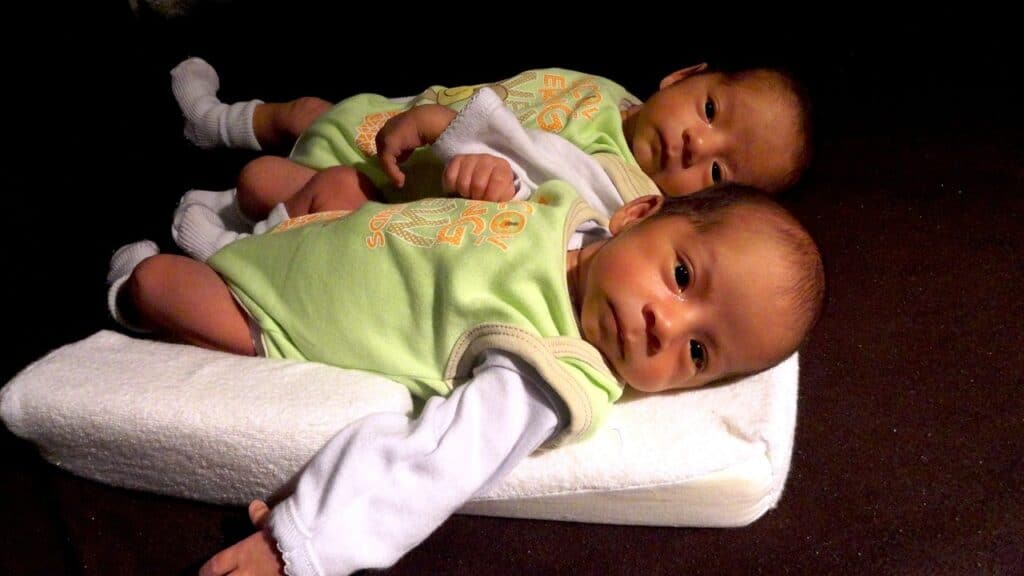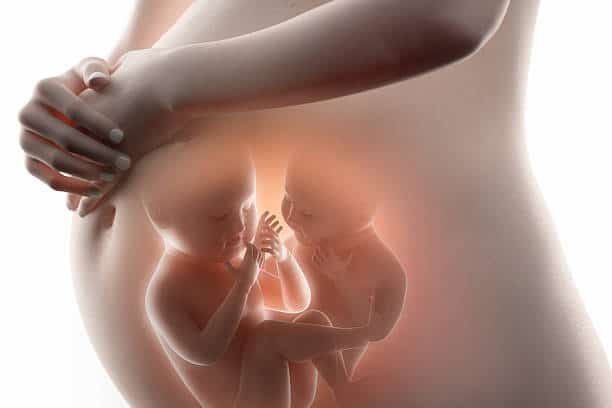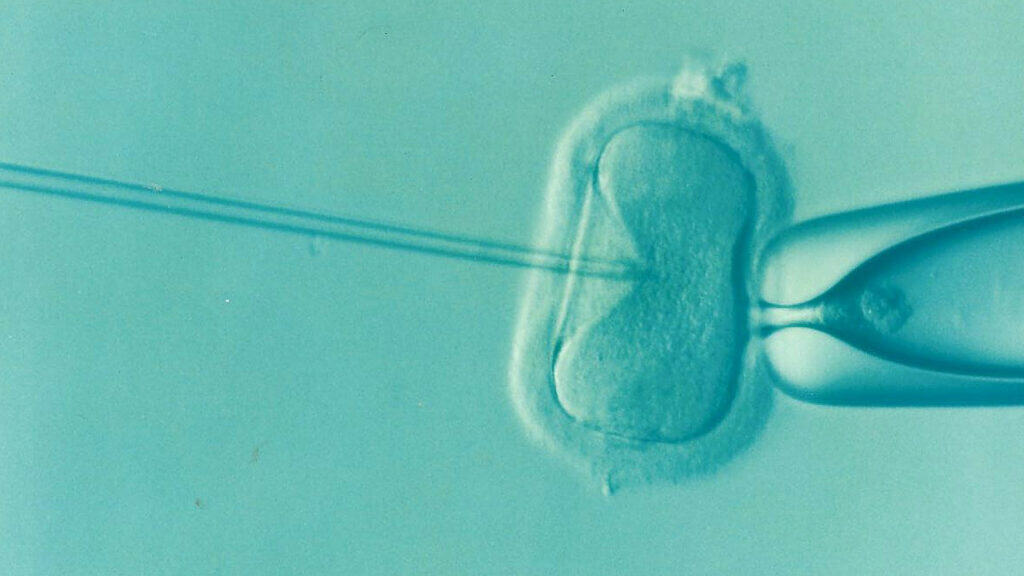Fraternal twins are a fascinating phenomenon, as they are the result of two separate eggs being fertilized by two separate sperm. This means that fraternal twins are essentially siblings who happen to be born at the same time.
Given that fraternal twins come from separate eggs, it is natural to wonder whether they have the same blood type or not.
The answer to this question is not straightforward, as fraternal twins can have different blood types just like any other siblings. This is because blood type is determined by genetics, and fraternal twins inherit different sets of genes from their parents.
However, there are some cases where fraternal twins can have the same blood type, particularly if they inherit the same genes from their parents.

Key Takeaways
- Fraternal twins are siblings who are born at the same time and come from separate eggs.
- Fraternal twins can have different blood types, just like any other siblings.
- There are cases where fraternal twins can have the same blood type if they inherit the same genes from their parents.
1. Understanding Fraternal Twins

Fraternal twins, also known as dizygotic twins, are formed when two separate eggs are fertilized by two different sperm. This results in two separate embryos developing in the uterus at the same time.
Fraternal twins are genetically no more similar than any other siblings, sharing approximately 50% of their DNA.
One common question that arises when discussing fraternal twins is whether or not they have the same blood type. The answer is no, fraternal twins do not necessarily have the same blood type.
This is because blood type is determined by the genes inherited from both parents, and fraternal twins can inherit different combinations of genes from their parents.
For example, if one parent has blood type A and the other has blood type B, their fraternal twins could each inherit a different combination of genes, resulting in one twin having blood type A and the other having blood type B. It is also possible for both twins to have the same blood type if they inherit identical genes from their parents.
It is important to note that blood type is not the only trait that can differ between fraternal twins. They can have different physical features, personalities, and even different medical conditions.
This is because fraternal twins are not identical, but rather two separate individuals who happen to have been conceived at the same time.
In conclusion, fraternal twins are formed when two separate eggs are fertilized by two different sperm, resulting in two separate embryos developing in the uterus. They are genetically no more similar than any other siblings and can have different blood types, physical features, personalities, and medical conditions.
2. Genetics of Fraternal Twins

Fraternal twins, also known as dizygotic twins, are formed when two separate eggs are fertilized by two different sperm. As a result, fraternal twins are not genetically identical and can have different blood types.
Blood type is determined by the presence or absence of certain antigens on the surface of red blood cells. There are four main blood types: A, B, AB, and O.
Each blood type is determined by the combination of two alleles inherited from each parent.
In the case of fraternal twins, each twin inherits a unique combination of alleles from their parents. Therefore, it is possible for fraternal twins to have different blood types if they inherit different alleles for the ABO blood group system.
While fraternal twins are not genetically identical, they do share approximately 50% of their DNA. This is because they both inherit half of their DNA from their mother and half from their father.
However, the specific genes and genetic markers that each twin inherits can vary, leading to differences in physical traits and predispositions to certain diseases.
Overall, the genetics of fraternal twins are complex and can vary depending on the specific genes and alleles inherited from their parents. However, it is clear that fraternal twins can have different blood types due to inheriting different alleles for the ABO blood group system.
3. Blood Types and Fraternal Twins

Blood types are determined by the presence or absence of certain antigens on the surface of red blood cells. There are four main blood types: A, B, AB, and O.
Each blood type is further classified as either Rh-positive or Rh-negative, depending on the presence or absence of the Rh factor.
Fraternal twins, also known as dizygotic twins, are the result of two separate fertilized eggs. As a result, they can have different blood types, just like any other siblings born to the same parents.
For example, one twin may have blood type A while the other twin has blood type B. It is also possible for one twin to be Rh-positive while the other twin is Rh-negative.
However, if both parents have the same blood type and are both Rh-positive or Rh-negative, it is more likely that their fraternal twins will have the same blood type and Rh factor. This is because the genes responsible for determining blood type and Rh factor are inherited from the parents.
In summary, fraternal twins can have different blood types and Rh factors, just like any other siblings. The likelihood of them having the same blood type and Rh factor depends on the blood types and Rh factors of their parents.
4. Pregnancy and Fraternal Twins

During pregnancy, the placenta plays a crucial role in providing nutrients and oxygen to the developing fetus. In the case of fraternal twins, each fetus has its own placenta.
This means that each twin has a separate blood supply, and therefore, they can have different blood types.
It is possible for fraternal twins to have the same blood type, but it is not guaranteed. This is because each twin inherits their blood type independently from their parents.
For example, if one twin inherits blood type A from their mother and blood type B from their father, and the other twin inherits blood type B from their mother and blood type A from their father, then they will have different blood types.
In some cases, fraternal twins may develop a condition called twin-to-twin transfusion syndrome. This occurs when blood vessels in the shared placenta connect the circulatory systems of the twins, causing an uneven flow of blood between them.
This can lead to one twin receiving too much blood and the other twin receiving too little, which can cause serious health problems.
The amniotic sac, which surrounds each fetus, also plays a role in the development of fraternal twins. Each twin has their own amniotic sac, which helps to protect and cushion them during pregnancy.
However, in some cases, the amniotic sacs may rupture early, which can increase the risk of complications such as infection and premature birth.
In conclusion, while fraternal twins can have the same blood type, it is not guaranteed. Each twin has their own placenta and amniotic sac, which can affect their development during pregnancy.
It is important for expectant mothers of twins to receive regular prenatal care to monitor for any potential complications.
5. Difference Between Fraternal and Identical Twins

Fraternal twins and identical twins are two types of multiple births. Identical twins are also called monozygotic twins.
They are formed when a single fertilized egg splits into two embryos. Fraternal twins, on the other hand, are also called dizygotic twins.
They are formed when two separate eggs are fertilized by two separate sperms.
One of the major differences between fraternal and identical twins is their genetic makeup. Identical twins share the same DNA, while fraternal twins share only about 50% of their DNA.
This is because identical twins are formed from a single fertilized egg, which splits into two embryos. Fraternal twins, on the other hand, are formed from two separate eggs, each fertilized by a separate sperm.
Another difference between fraternal and identical twins is their physical appearance. Identical twins look almost exactly alike, while fraternal twins may or may not look alike.
Identical twins also have the same blood type, while fraternal twins may have different blood types.
The zygosity of twins refers to the degree of genetic similarity between them. Identical twins are always monozygotic, meaning they come from the same fertilized egg.
Fraternal twins can be either monozygotic or dizygotic, depending on whether the two eggs were fertilized by the same sperm or by different sperms.
In conclusion, the main differences between fraternal and identical twins are their genetic makeup, physical appearance, and zygosity. Identical twins are formed from a single fertilized egg and share the same DNA, while fraternal twins are formed from two separate eggs and share only about 50% of their DNA.
Identical twins look almost exactly alike, while fraternal twins may or may not look alike. Finally, identical twins are always monozygotic, while fraternal twins can be either monozygotic or dizygotic.
6. Role of In Vitro Fertilization

In vitro fertilization (IVF) is a type of assisted reproductive technology that involves fertilizing an egg with sperm outside the body in a laboratory. This procedure is often used by couples who are struggling to conceive naturally.
IVF can also be used to help couples who are carriers of genetic disorders to avoid passing them on to their children.
During IVF treatment, a woman’s ovaries are stimulated with hormones to produce multiple eggs. These eggs are then retrieved and fertilized with sperm in a laboratory dish.
The resulting embryos are monitored for several days to ensure they are developing properly. One or more embryos are then transferred to the woman’s uterus to implant and hopefully result in a successful pregnancy.
In terms of blood type, IVF does not impact whether fraternal twins will have the same blood type or not. This is because each embryo develops independently and can have its own unique genetic makeup.
However, if the parents of the twins have different blood types, there is a chance that one twin may inherit one blood type from the mother and the other twin may inherit a different blood type from the father.
Overall, IVF can be an effective treatment option for couples struggling with infertility or genetic disorders. It is important to discuss the potential risks and benefits of IVF with a qualified medical professional before deciding to undergo treatment.
7. Twin Births Around the World

Twin births are not as rare as they used to be. In fact, according to the World Health Organization (WHO), the rate of twin births has increased over the past few decades.
In 2015, there were approximately 12.5 million live births of twins or higher-order multiples worldwide. This accounts for about 1.6% of all live births.
The rate of twin births varies widely across different regions of the world. For example, in Asia, the rate of twin births is relatively low, with only about 1 in 80 pregnancies resulting in twins.
In contrast, in Africa, the rate of twin births is much higher, with about 1 in 40 pregnancies resulting in twins.
There are also significant differences in the rate of twin births within countries. For example, in the United States, the rate of twin births is highest in the state of Connecticut, where about 1 in 30 pregnancies results in twins.
In contrast, the rate of twin births is lowest in the state of New Mexico, where only about 1 in 70 pregnancies results in twins.
Overall, multiple births are more common in older women, women who have had multiple pregnancies, and women who use fertility treatments. However, the exact factors that contribute to twin births are still not fully understood.
Regarding blood type, fraternal twins can have different blood types if they inherit different blood type genes from each parent. This means that it is possible for one twin to have type A blood and the other twin to have type B blood.
However, identical twins will always have the same blood type since they develop from the same fertilized egg.
8. Testing and Identifying Twins

Identifying twins can be challenging, especially when they are fraternal. One of the most common questions that people ask is whether fraternal twins have the same blood type.
The answer is no, they do not.
To determine the blood type of twins, a blood test is required. This test involves taking a small sample of blood from each twin and analyzing it in a laboratory.
The results will show whether the twins have the same blood type or not.
Another way to identify twins is through DNA testing. This test involves taking a sample of DNA from each twin and comparing it to determine whether they are identical or fraternal.
This test can also provide information about other genetic traits that the twins may share.
Ultrasound is another method used to identify twins. This test uses sound waves to create images of the fetus in the womb.
It can show whether the twins share a placenta or have separate placentas, which can help determine whether they are identical or fraternal.
Fingerprints are also unique to each individual, including twins. While identical twins may have similar fingerprints, they are not identical.
Therefore, fingerprints can be used to distinguish between twins.
In summary, there are several methods to identify and test twins, including blood tests, DNA testing, ultrasound, and fingerprints. While fraternal twins do not have the same blood type, they can still share other genetic traits.
9. Miscellaneous Facts About Twins

Twins have always been a subject of fascination for people all around the world. Here are some miscellaneous facts about twins that you may find interesting:
- Siblings of twins are more likely to have twins themselves. This is because having twins can be hereditary and can be passed down through generations.
- Parents of fraternal twins are more likely to have more twins in the future, especially if the mother is over the age of 35. This is because as a woman ages, her body produces more follicle-stimulating hormone, which can cause the release of multiple eggs during ovulation.
- Non-identical twins, also known as fraternal twins, can have different blood types. This is because each twin inherits a unique combination of genes from their parents, which can affect their blood type.
- Twins can be born with different heights and weights, even if they are identical twins. This is because environmental factors such as nutrition and physical activity can affect their growth and development.
- Twins can be born with different genders, although it is rare. This can happen when one twin has a genetic condition that affects their sexual development.
- Conjoined twins are identical twins who are born physically connected to each other. This occurs when the fertilized egg splits later than usual, causing the twins to develop abnormally. Conjoined twins can share organs, limbs, or even parts of their brains.
In conclusion, twins are a fascinating subject and there is still much to learn about them. From hereditary factors to physical development, twins can vary greatly from each other and provide a unique insight into the complexities of human biology.
Related: How Do Conjoined Twins Use the Bathroom
Frequently Asked Questions
Fraternal twins develop from two separate eggs that are fertilized by two different sperm. As a result, they have their own separate placentas. In some cases, however, fraternal twins may share a placenta, but this is less common and can increase the risk of certain complications.
How to tell if twins are identical or fraternal from ultrasound
An ultrasound can help determine whether twins are identical or fraternal. If the twins have separate placentas and amniotic sacs, they are likely fraternal. If they share a placenta and amniotic sac, they are more likely identical. However, it is not always possible to determine the type of twins from an ultrasound alone.
Can fraternal twins be the same gender?
Yes, fraternal twins can be the same gender or different genders. Fraternal twins occur when two separate eggs are fertilized by two different sperm, which can result in either two boys, two girls, or one of each.
Do identical twins have the same fingerprints?
Identical twins do not have the same fingerprints. Fingerprints are determined by a combination of genetic and environmental factors, and even identical twins have unique patterns.
Is it possible for fraternal twins to have different blood types?
Yes, fraternal twins can have different blood types. Fraternal twins develop from two separate eggs that are fertilized by two different sperm, and each twin may inherit different blood type genes from their parents.
Why do fraternal twins have different blood types?
Fraternal twins can have different blood types because they inherit different combinations of blood type genes from their parents. Each parent contributes one blood type gene, and the combination of these genes determines the child’s blood type. Since fraternal twins develop from two separate eggs, they can inherit different combinations of genes from their parents and have different blood types.

Iesha is a loving mother of 2 beautiful children. She’s an active parent who enjoys indoor and outdoor adventures with her family. Her mission is to share practical and realistic parenting advice to help the parenting community becoming stronger.
